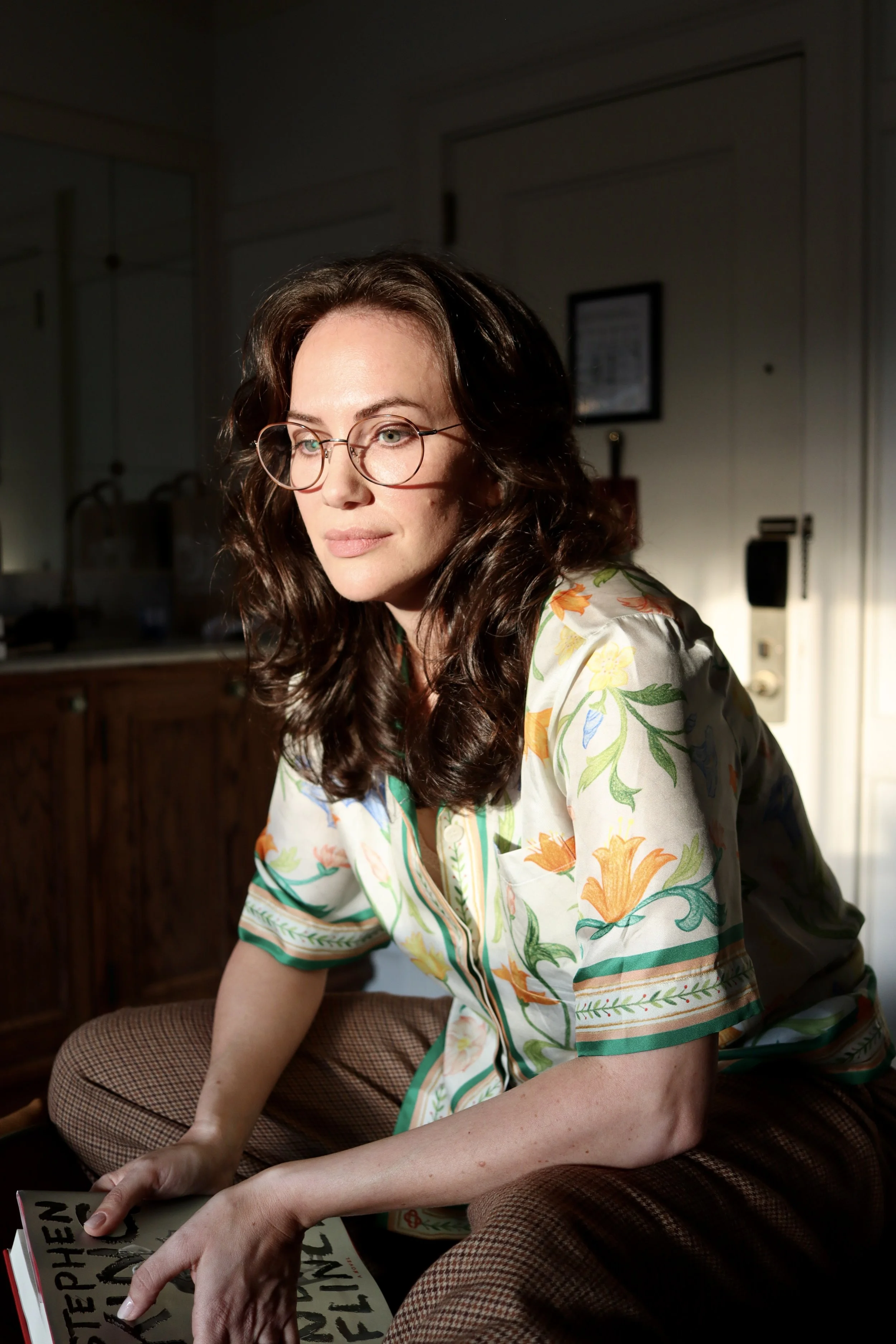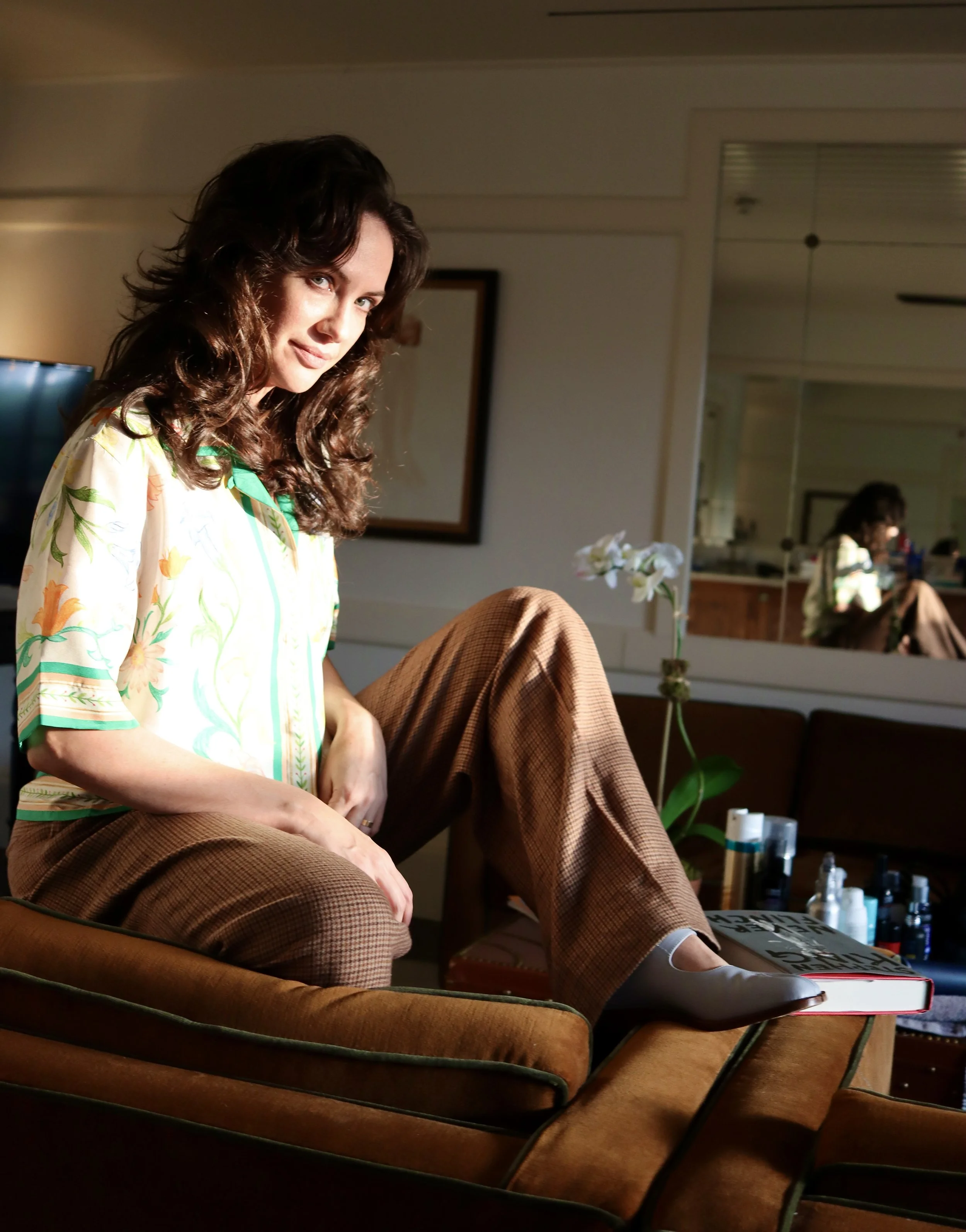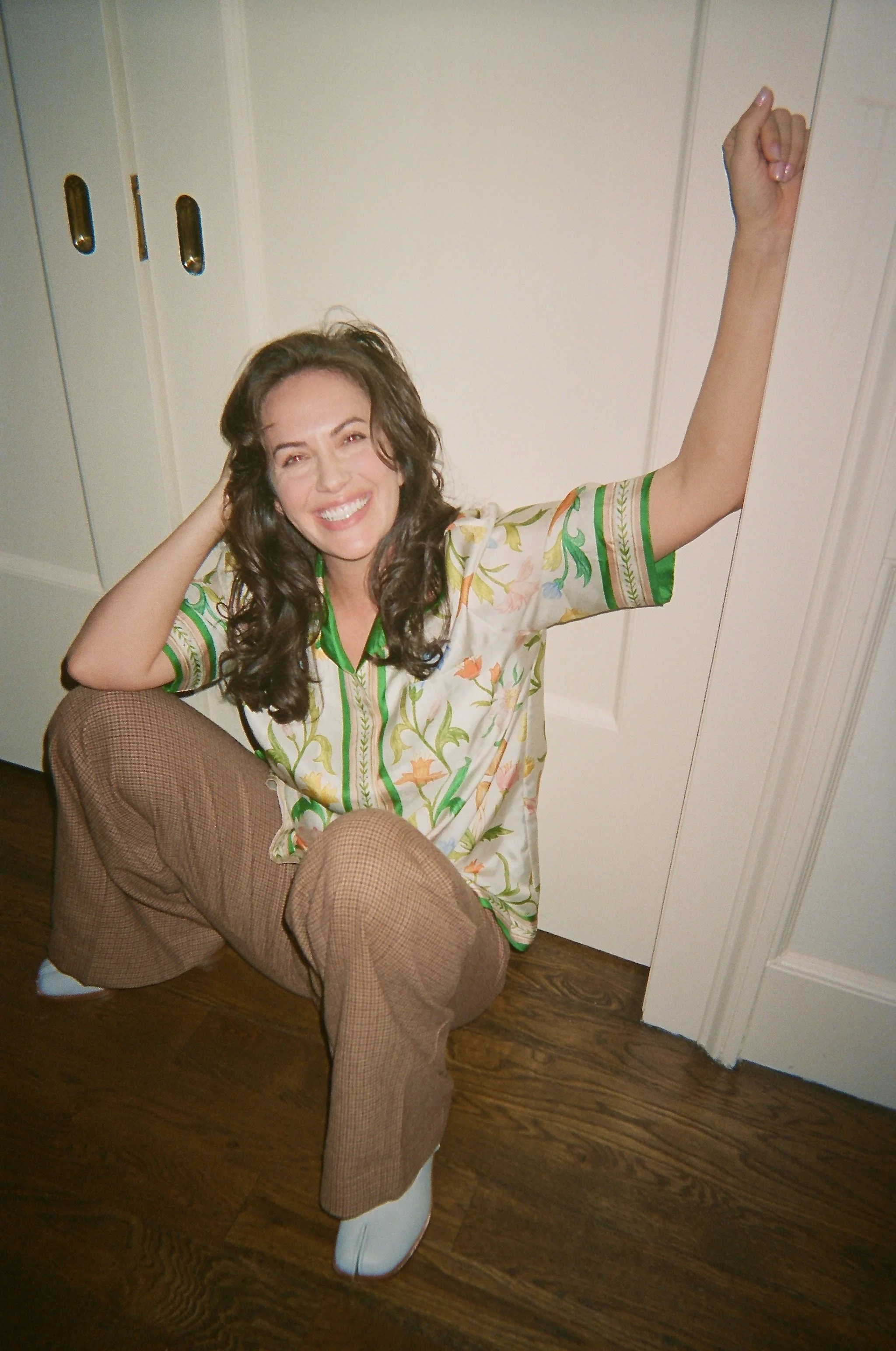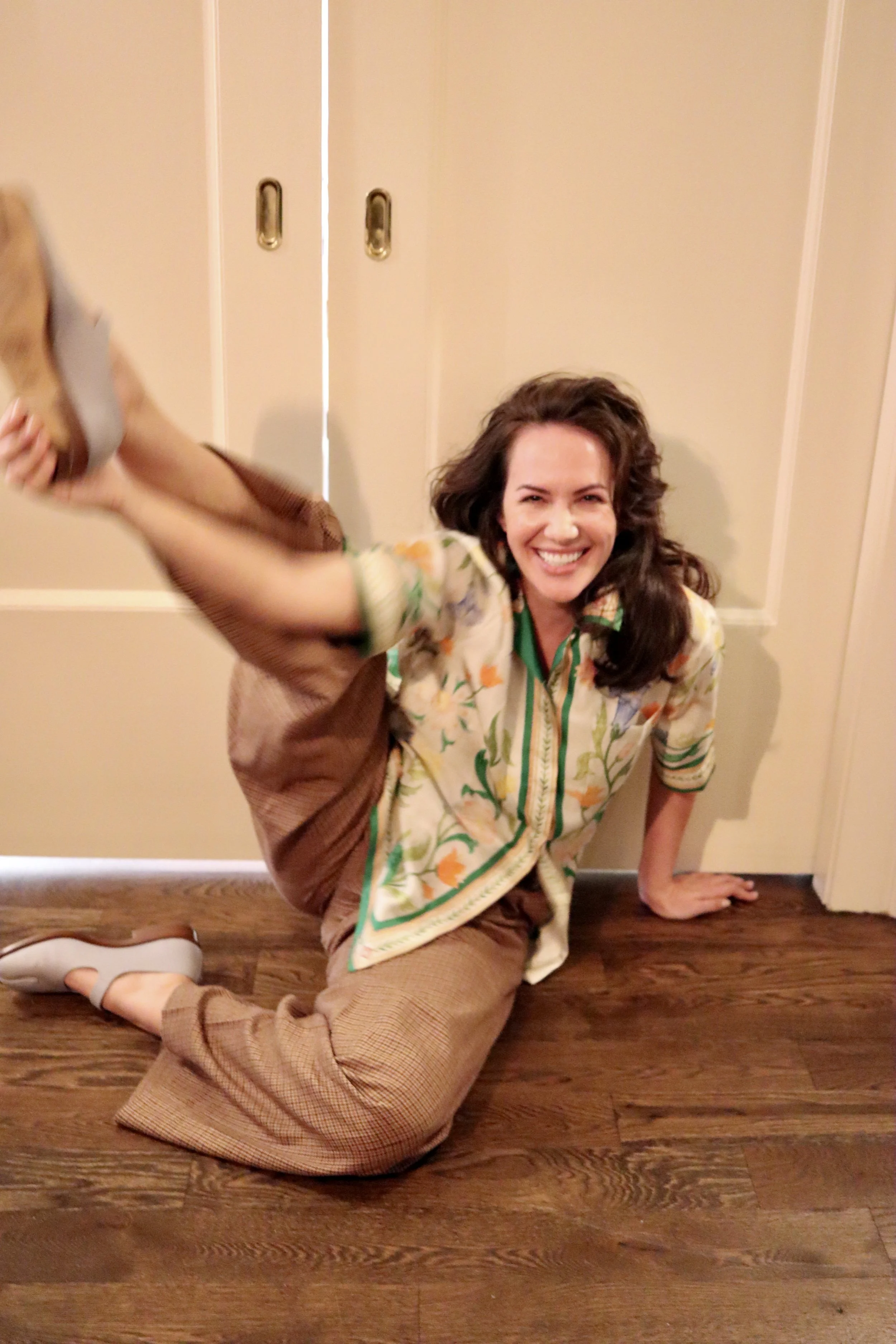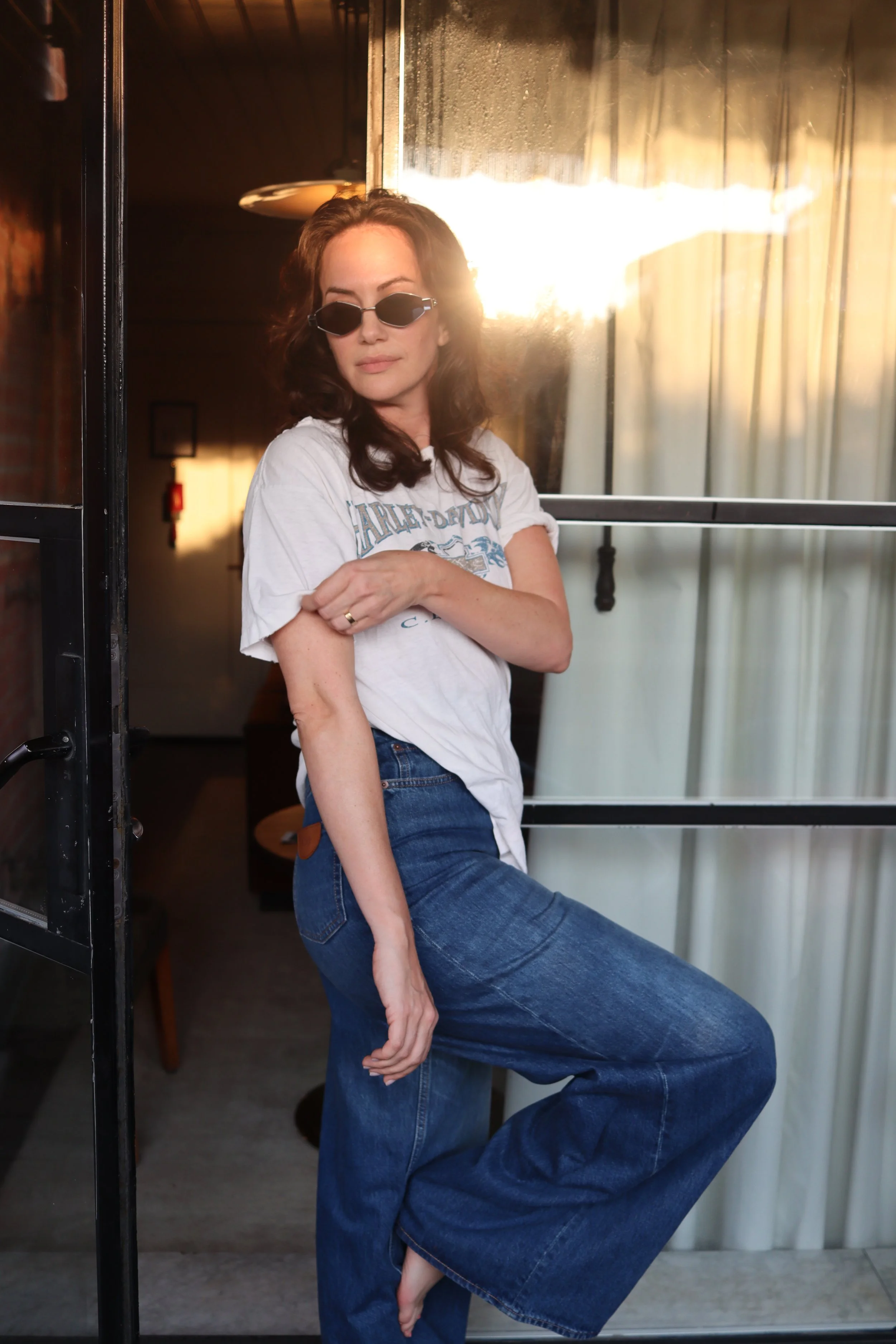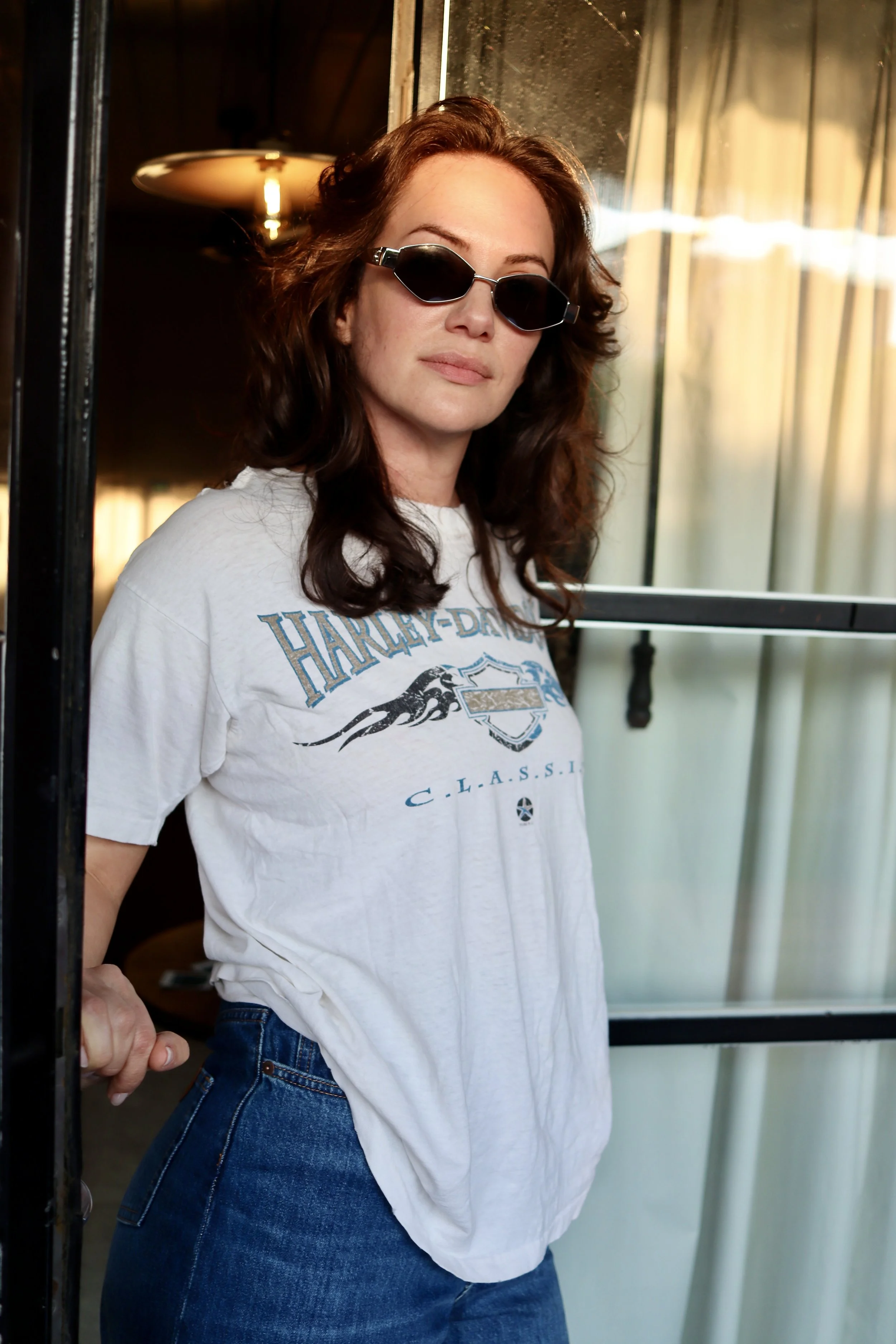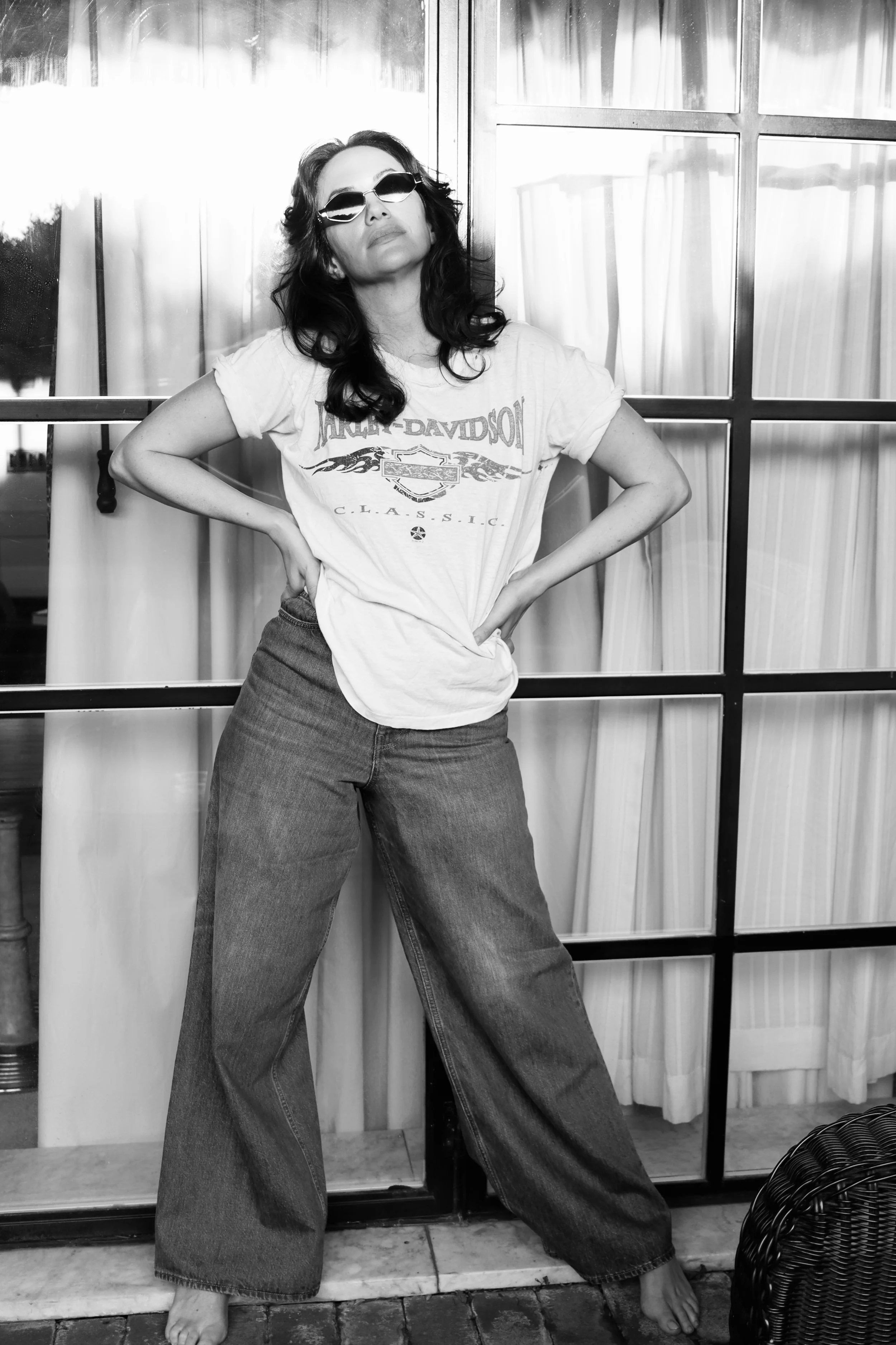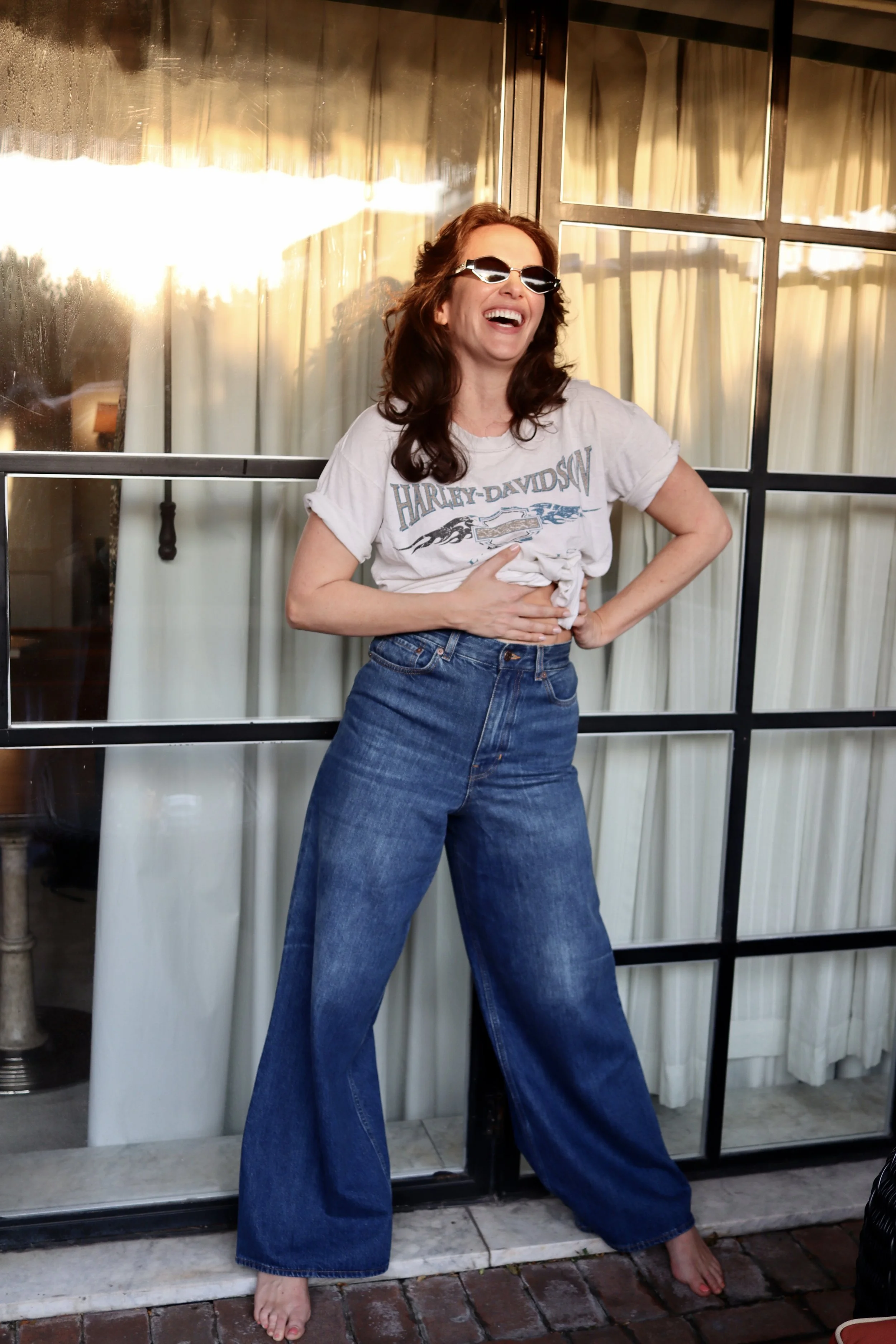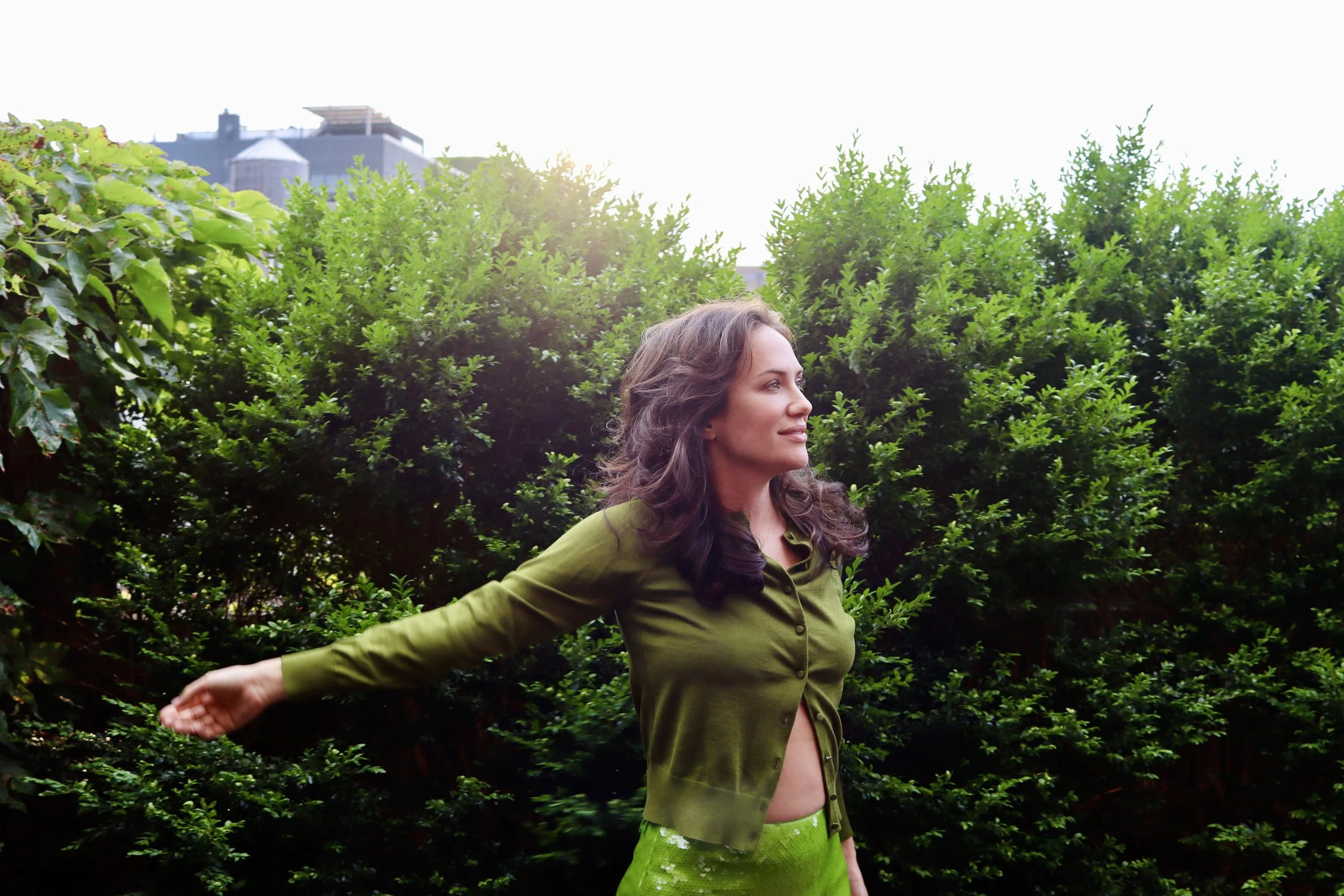Kate Siegel
we asked actor/director/writer Kate Siegel if there was anyone in particular she would like to chat with for her interview and without hesitation she said Samantha Sloyan. they are longtime friends and have co-starred on many projects including Midnight Mass, The Haunting of Hill House, The Fall of the House of Usher and most recently The Life of Chuck. Kate is now expanding her focus to directing and has officially launched her own production company Legitimate Pictures with her upcoming directorial debut feature called Method. so scroll down and check our photo diary of Kate in NYC and her candid chat with Samantha as they sat down between shooting scenes for the new Mike Flanagan TV series Carrie to discuss their unbreakable bond, dream projects, love of a multiverse and advice learned along the way.
Samantha Sloyan: Look, I am going to ask a hard-hitting first question, Kate.
Kate Siegel: I'm ready.
SS: What people might not know about you is when you accepted this directing job, all these things suddenly felt like they fell into place. Things I've known about you. So, when I met you... you have always, in retrospect, been a writer. We met many years ago in an acting class and you sent me a script that you had written about sisters. It had this wonderful moment where somebody was eating a salad on top of a pizza box because they needed to finish the salad in order to allow themselves to get to the pizza. And then, when you would put up scenes in class you had such an opinion on not just the choices you were making as an actor, but what the set looked like, what you were wearing and even the lighting.
Do things seem to make sense in a different way because it felt like you'd always had a weird pair of gills and we didn't know why and then one day you were like, oh, it's because I can breathe underwater? And I was wondering if there was a moment that you can point to that was your kind of like, aha moment?
KS: For of all, that was a beautifully phrased question from a glorious brain. God, what a journalist you are. I can’t say enough.
SS: I am. I found my second calling ...journalism.
KS: (laughs) Yeah, you describe it perfectly. First of all, if you still have that script, please send it to me because it has one of my favorite lines of all time, which is- one of the characters is drinking olive juice out of a jar and the other one says “pour some vodka in that olive juice and drink it like an adult.” I've always wanted to reuse that.
But yes, you're right. It's cliche to hear an actress go, what I really want to do is direct. It's deeply cliché. But what happened was exactly what you said— a bunch of stuff that were weird things I thought were detrimental to my acting became advantages to my directing. And the first time I noticed that was day one or day two of prep for VHS: Beyond. I was shot listing with Michael Fimognari and he asked... “what do you think this is? What does this look like? Where is the camera?” And I realized for my entire acting career I had softened the edges of my opinions because it wasn’t my story. It's not my circus; it's not my monkeys. I am an acting department person, which means I go where I'm told- there's a little bit of wiggle room, but really, you're at service. So, I spent a lot of energy taking my opinions about how a scene should go, filtering them into ones that might be appropriate and then softening them further so that they're not out of bounds.
And now, when someone asked me directly, “how does it go?” I am just allowed to answer. There’s a feeling of freedom in that. And somebody would present me with “oh, you said this set looks like this, but because of budget constraints, how do you feel about this?” And I could either say yes or no, or I could say yes and or no, but... It was the freedom to drop a bunch of filters. And I had less…I don't know what it is— I haven't quite untangled it, this feeling that failure in directing felt like learning and failure in acting felt like dying.
SS: That’s so interesting. I love that. I’m going to remember it.
Since you now have these two things, acting and directing, and you aren’t going to stop acting… What do you think directing is going to help bring to your acting? Or the more logical question is how is your acting going to help your directing —I feel like that’s a more of a straight line. But the opposite flow, what do you think?
KS: Again, great question. I love your outfit. And I’m sure you smell really good.
SS: (laughs)
KS: I do like the reverse because acting informs directing in ways that I think people can imagine. It's how you deal with actors. It's how you tell stories. The way I think directing will help acting is less linear. I only really have a metaphor for this...
If my brain was a horse barn and [there was a] big white horse that is acting, and the next stall was a mangy mule that is directing. Every single time I pull out the white horse, the mule would kick the barn door and be like, me, me, me, me, me, me, me. And I'd have to ignore that sound while I was riding the horse. But if I exhausted the mule and I gave it a cart to pull, all those things…. when I tuckered it out, the mule would be quiet. And so, I imagine there will be less pressure on acting to fulfill all of my creative needs and maybe, ideally, that will lend some ease to my acting. It will give it an influx of joy again.
SS: Yes, because boots on the ground is so much smaller with acting. When you are directing, you are starting in pre-production, you are there every day and then you take the project once the cameras have stopped.
KS: That’s the thing that really surprised me. I knew as an actor I was a cog, a tiny part of the system, but I didn't realize there were actually three movies you make. There's the movie you make in your head, and then there's the movie that happens on set. And then there's a whole other movie that's the bulk of your work, which is post. The actors are only there for a small percentage of that center movie. It's very interesting. It was an interesting realization about how significant and insignificant we are at the same time as actors.
SS: True!
So, People may or may not know that you are a voracious reader. I was wondering if there is something out there right now that you have come across and kept in your back pocket to develop later on screen. Or does this step on… you don’t want to say the name because then someone may take it?
KS: The ones that I want, the ones that I dream about literally and figuratively are properties that require such a large budget but have such a niche audience that they probably will never get made. My favorite answer to this is always The Night Circus by Erin Morgenstern. It’s so beautiful! It’s an epic story about a magical circus that travels the world at night and it's so gothic and beautiful. It's all Guillermo-del-Toro-style set pieces with creatures and humans and longing and love and heartbreak. But again, it would cost hundreds of millions of dollars to do practically, and it's a fantasy. And it's like a gothic fantasy, which is not going to be drawing lots of people to the theater, but maybe someday I'll have “fuck you” influence and they'll let me do whatever I want. That's a great dream.
And then there's another one that I was devouring on set the other day called The Book of Accidents.—
SS: You pointed it out to me! You were like, thumbs up.
KS: Yes, everyone was watching the monitor; talking about important businessy things, and I just turned to you, and I mouth… Good book. Good. And then I went back to reading. But The Book of Accidents is sort of this…it lives in the world of Stranger Things, and it lives in the world of IT, but it also lives in a multiverse, and you know I love a multiverse.
kate wears her own vintage t-shirt
SS: I do. I do.
KS: I believe in a multiverse and that I have slipped back and forth a few times.
SS: Yes. The cookie verse. We understand.
KS: Sidebar, the cookie verse was when my oven was not calibrated right. And so all of my cookies wouldn't bake. And so, I assumed I had moved into a multiverse where cookies don't work. I'm not entirely sure on that, um, but anyway, I love the multiverse and the book.
SS: Oh, yeah. That's the logical step. I mean, step one: something's wrong. Step two: multiverse. There’s no in between.
KS: Facts. But The Book of Accidents would have to be a series like Stranger Things, but again, so much money. I would need to have Mike Flanagan levels of influence to be able to make that. But I love it. It's not impossible.
SS: Not impossible. And I also know, because you and I have done tiny unpaid theater together as well, that you are a creative problem solver who can make a lot with a little money.
KS: You know what I thought of the other day….
SS: Oh, share.
KS: So, we were having dinner, you, me, Rahul (Kohli), Fimi and Prime. And we were talking about theater, and we talked about you and Rahul doing Macbeth, which, Mike [Flanagan] and I started to talk about how we’d both want to direct that. And then I— because Mike went off to work really hard on a bunch of projects and I had some time to ruminate on it— I had this idea….
SS: This is literally another question I have. So, you go and then I'll ask the question, like a newlywed game where you give the answer and I give the question.
KS: Laughs. I love it.
You know The Picture of Dorian Gray that Sarah Snook is doing right now and it's a multimedia theater production?
SS: Yes, yes. I've been reading about it. Sounds amazing.
KS: I think a multimedia Macbeth could happen. All of the monologues? It's like a reality TV show or a documentary and the soliloquies are talking-head confessionals.
SS: Oh wow. That'd be something. So often with your ideas, I'm always like, YES.
KS: The story of Macbeth could be a documentary; it could have a reality show vibe to it. The way that Macbeth always feels like he's watching or being watched . And that on-set feeling of everywhere you go, a herd of elephants follows you, and that puts so much pressure on everything you do. And then these huge projected talking head interviews.
SS: I love it. And, we have all these documentaries that come out before the events are finished, which I have opinions about but, these downfalls. I love it.
KS: Reality TV, in my opinion, is our modern-day Roman Colosseum. Devastate people for entertainment. I see this on Love Island. I see this and I love it. You love to watch them die emotionally. And we just throw them in there. There's so much I'd like to say about that. You’d have to have live theater for that. [The audience] needs to be implicit. What makes the Colosseum so disturbing to me is that they all were there physically. Like I can't run onto the set of Love Island and pull Huda out of her situation. That’s the type of thing I'd like to explore in Macbeth.
SS: Yes. And then my question was just that people don't know this, but you are what would qualify as a Shakespeare nerd. And I was going to ask you if there was any one of them, what would you do… so I'm a psychic and a journalist.
KS: (Laughs) But it would have to be you and Rahul. The Rahulness of it is specific. He's my perfect Macbeth and you are my perfect Lady Macbeth.
SS: Let's do it. Done.
Here’s a question that nobody asked but I’m going to do it.
KS: Who is your least favorite cast member and why?
SS: (laughs) Name something you hate about everybody you know….
KS: (laughs) Redacted.
SS: No, so let's go back to the big dream because look, this is a side question, but also what I know about Kate Siegel, is that you are an achiever and not just in the sense of you walk into everything and you're instantly good at it. But you just become interested, and you fall on your face, and you fall on your face, and you pick yourself up and you do it again. And if there's anybody in this world who I think could work your way into making a giant movie, It’s you. You get people on board. You are the kid that's like, let's start a game and this is how the game goes. You also host game nights. So, you know, you do this literally.
KS: I literally do that.
SS: You literally do this.
SS: So, I'm going to give you some big-ticket movie concepts and you're going to tell me which one you want to do. Some have follow-up questions, some do not.
KS: Oh my gosh.
SS: Okay. One is just a standard biopic, but a biopic that could be anything. It could be Caesar, or it could be some dude who runs a video shop. The other is a big-ticket period piece so if you were to make a movie about the Colosseum, there's that. The other is a creature feature, so you have a Godzilla type thing. Next is superhero movie; A natural disaster which could be volcano or a tsunami, and lastly a spaceship, spacetime movie, which is what I call it.
KS: Obviously it's spacetime movie! Space movie for space people! I freaking love space movies. It's the way that Mike feels about shark movies or you feel about British detective tv. There is no bad space movie.
I have a question for you. Why are you so wonderful and good at this?
SS: I had what a medical professional would call a dangerous amount of coffee this morning.
KS: Fair enough.
SS: Okay, so I have two more questions to round us out.
KS: I also would like to point out at this point in the interview that I'm getting hives a little because when you and I have a conversation, it's a conversation and I ask you things and you ask me things. And we take turns talking, and the fact that I have not done that yet… is stressing me out.
SS: (laughs) One of my last questions is this. You and I together have both been through a lot, yes in life, but with our careers and with our arts and acting in this business. You and I have been through heartache and self-doubt. And I was wondering is there something you want to say to those people who wondering, like we were, if things were ever gonna go our way? And knowing that, we never assumed that it would. If anything (laughs) we assumed it wouldn't. And we've held on for a long, long time, and especially you having found something new “late in the game.” Not late in the game, but—
KS: Pretty late in the game for an actress.
SS: Well, yes, but let's pretend like we're just not going to believe that anymore because it was bullshit anyway. Is there any advice you might have to offer up?
KS: Two things come to mind right away when you ask that extremely brilliant and well thought out question. One was, I think it was Felicity Huffman who said, when she held her Oscar, “the second time I didn't work for five years. I gave up on dreams like this.” There was something about that that became a mantra to me. Lsten, if you were going to be a professional doctor, you would go to four years of medical school and then four years of graduate school and four years of doctorate school, and then you have to do your residency, which almost kills you. And then at the end of it, you become a doctor. And I remember thinking, okay, this is like that. If by luck of the multiverse, I win the lottery and I’m successful at 22? Great! But the plan is, I am becoming a doctor. All of that was just what I needed and what I told myself, at the beginning and middle. It was about how to stick with it when literally everyone was winning around me or quitting.
And the other thing is that, before, I never wanted to present a work in progress. Like, I always knew I was flawed. And I felt that before I could be successful, those flaws had to be fixed. And now I realize as I got older, those very flaws are the things that are interesting.
Like I am so messy. I throw my clothes around when I get home and I would think, ugh, what a mess I am. People must think I'm so awful. And then I married somebody who occasionally throws their clothes around and I love him for it. And all these little things that my friends think are their flaws, I think of as their bonuses. And you should start sharing those in your art. You don’t even have to accept them! All you have to do is not hide them. Then your art gets very specific and personal, and you're doing this individual true expression, even though you don't think it's perfect.
But THAT is when you start attracting the people who are making real stuff. And I don't know how the rest of it happens, because that's how it worked for me. But there's something there like, if it was perfect, it would be advertising. If you were perfect, you would be an influencer, but if you want to be an artist, you must show the flaws, even if you hate them.
SS: I think that’s great advise. I will take some of it.
KS: But we talk about this all the time, when we want to crawl under a table instead of watching ourselves [on screen]. And how we watch our friends on screen in any number of series we've done with them, and go, “genius actor, genius actor, genius actor, disgusting thumb person, genius actor, genius actor, genius actor.” You must accept that it's a divine dissatisfaction, I think [Martha Graham] calls it that. You will never be satisfied and that’s beautiful - that’s the point.
SS: Yes, I love that.
KS: Oh wait, I have one more thing, sorry. One more piece of advice. My entire world got better when I stopped drinking and doing drugs. And so, if you are finding yourself stuck and you think you might be drinking too much or doing drugs, I might suggest you stop.
SS: I know this, but I think others may not, but you found the program was helpful.
KS: Yes, I started in the program. 12 steps. But there are a lot of different options.
SS: A lot of different options. But if you're looking for somewhere to start, that's a good start.
And the last thing reflects on the above because I know you as someone who does hard things, and that being one of them. You are a goal focused human being, in a way that I find admirable and specific and that has been very helpful to you. So, I am wondering what's your next goal?
KS: professionally or personally?
SS: Either.
KS: My big goal, the gold star that I'm working for, the top of Mount Everest, is I need all my children to be sane human beings. They will be damaged by the world, but I would like to give them a secure connection to their life. So, the 10-year goal, 15-year goal is that I've raised good humans. That's very important to me and that's a daily practice.
And then I would really like to direct and have the time to dive into directing for a while. And then lastly, I would like to play a grouchy scientist.
SS: Damn right.
KS: Those are the three.
SS: All right. Well then, I will just be next to you watching you do all three of those things for the next foreseeable future. Literally next to you.
KS: No, because either you're going to be in the movie, you're the godparent of my kids, or if I'm a grouchy scientist, you are a shorter, more- or less-grouchy scientist.
photos/makeup: tina turnbow using merit beauty
hair: creighton bowman
stylist: nichole lumpkin
shot in nyc

